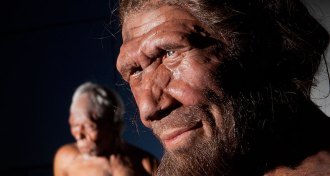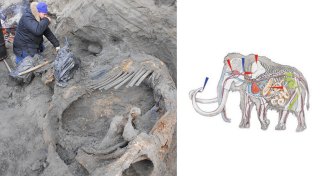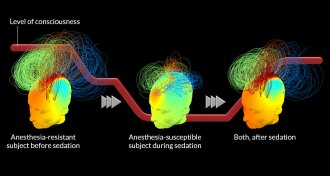Uncategorized
-
 Humans
HumansNo fairy tale: Origins of some famous stories go back thousands of years
Pairing folktales with ancient languages shows that at least a few folktales originated thousands of years ago.
-
 Life
LifeMicroRNAs manage gut microbes
MicroRNAs mold gut microbes into healthier communities for the host.
-
 Climate
ClimateAtmospheric tides alter rainfall rate
Atmospheric tides caused by the moon’s gravitational pull ever-so-slightly alter rainfall rates on Earth by producing rises and falls in atmospheric pressure.
-
 Science & Society
Science & SocietyHuman evolution, biomimicry and more go on display
A new human evolution gallery and a lecture series on Europa are among science events to explore in February 2016.
-
 Oceans
OceansOcean heating doubles
Earth’s oceans now absorb twice as much heat as they did 18 years ago, with more than a third of that warmth going into the ocean depths.
-
 Astronomy
AstronomyThe votes are in: Exoplanets get new names
Arion, Galileo and Poltergeist are just three winners of a contest to name planets and suns in 20 solar systems.
-
 Genetics
GeneticsBubonic plague hung out in Europe
The plague bacterium Yersinia pestis may have lurked in a medieval European reservoir for at least 300 years, researchers from Germany suggest January 13 in PLOS ONE.
-
 Life
LifeSearch is on for missing pieces in puzzle of male genital diversity
The debate over extreme diversity of male genitalia needs to rethink the female side. And the landscape.
By Susan Milius -
 Archaeology
ArchaeologyHumans visited Arctic earlier than thought
Human weapon injuries on mammoth bones show humans were in the Arctic up to 15,000 years earlier than researchers thought.
-
 Neuroscience
NeuroscienceMeasuring brain waves may help predict a patient’s response to anesthesia
Brain signatures hint at whether a person will resist or succumb to anesthesia.
-
 Environment
EnvironmentPCB levels still high in Europe’s killer whales, smaller dolphins
PCBs banned for decades still show up at extremely high concentrations in Europe’s killer whales and other dolphins.
By Susan Milius -
 Science & Society
Science & SocietyInsights into sexes’ differing responses to stress
Chronic stress takes its toll on everyone. One of our reporters follows a line of research suggesting that stress hits women harder (or at least differently) than men.
By Eva Emerson